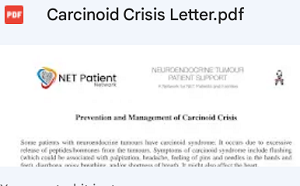Some patients with neuroendocrine tumours have carcinoid syndrome. It occurs due to excessive
release of peptides/hormones from the tumours.
Symptoms of carcinoid syndrome include flushing
(which could be associated with palpitation, headache, feeling of pins and needles in the hands and
feet), diarrhoea, noisy breathing, and/or shortness of breath. It might also affect the heart.
Carcinoid crisis is a rare complication in patients with carcinoid syndrome, although some patients
would not have a previous history of it. It is usually triggered by anaesthesia, invasive surgical and
interventional radiological procedures.
It is also possible that it occurs spontaneously without an obvious trigger. It occurs due to sudden massive release of peptides/hormones from the tumours.
This can manifest as severe flushing, palpitations, very low or high blood pressure, breathing
difficulties, and confusion.
Untreated or severe cases of carcinoid crisis could result in coma and/or death.
To prevent the carcinoid crisis
To prevent the carcinoid crisis, prophylactic intravenous octreotide should be administered
prior to invasive procedures. The octreotide should be diluted in normal saline and given in a dose
of 1000 mcg over 24 hours. It should be started 12 hours before, and continue for 24 to 48 hours after
the procedure.
Timing and dose adjustments of intravenous octreotide doses depend on the procedure
type and the severity of the patient’s carcinoid syndrome.
In some cases, prophylaxis with small subcutaneous octreotide doses is possible.
In minor procedures, for example dental procedures and ingrown toenails, prophylaxis is not needed.
Management of Carcinoid Crisis
The management of carcinoid crisis is individualized. A bolus dose of 100 mcg intravenous
octreotide should be given followed by infusion of 1500 to 2000 mcg over 24 hour.
Other management options, depending on the patient’s presentation, include Intravenous fluid, vasopressin,
alpha or beta blockers, and steroids. Some patients might need management at the intensive care unit.
For more information, please refer to the following:
The National Centre for Neuroendocrine Tumour,
St. Vincent’s University Hospital, Dublin
www.stvincents.ie
01-2214000
International Neuroendocrine Cancer Alliance (INCA)
www.incalliance.org
UK and Ireland Neuroendocrine Tumour Society (UKINETS)
www.ukinets.org
Download & Print
To download this information on headed paper, (as a PDF file), please click on this link or on the image below.
You can then print it and give to a medical professional, if you are at risk.


